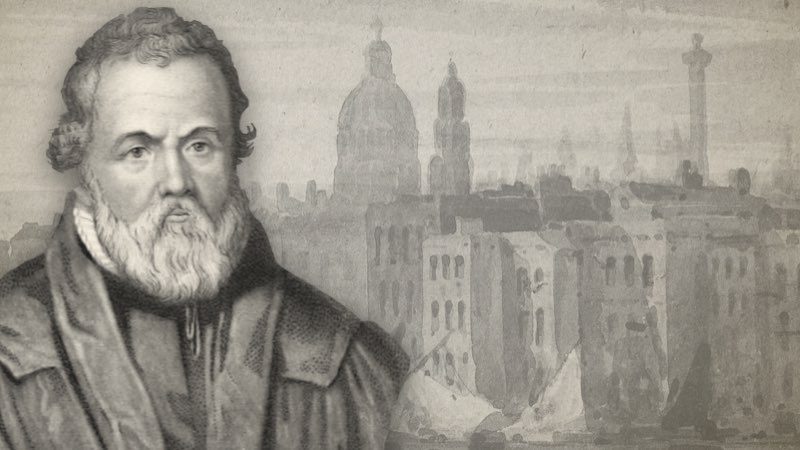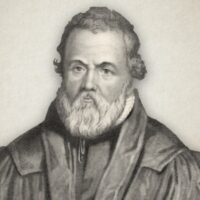
The Law and the Gospel
A Comparison Between The Old Man And The New, Also Between The Law And The Gospel, Containing A Short Sum Of All The Divinity Necessary For A Christian Conscience.
“The old man” therefore is more stronger, lusty, and stirring than is “the new man,” because the birth of “the new man” is but begun now, and “the old man” is perfectly born. And as “the old man” is more stirring, lusty, and stronger than “the new man;” so is the nature of him clean contrary to the nature of “the new man,” as being earthly and corrupt with Satan’s seed; the nature of “the new man” being heavenly, and blessed with the celestial seed of God. So that one man, inasmuch as he is corrupt with the seed of the serpent, is an “old man;” and inasmuch as he is blessed with the seed of God from above, he is a “new man.” And as, inasmuch as he is an “old man,” he is a sinner and an enemy to God; so, inasmuch as he is regenerate, he is righteous and holy and a friend to God, the seed of God preserving him from sin, so that he cannot sin as the seed of the serpent, wherewith he is corrupt even from his conception, inclineth him, yea, enforceth him to sin, and nothing else but to sin; so that the best part in man tofore regeneration, in God’s sight, is not only an enemy, but “enmity” itself.
One man therefore which is regenerate well may be called always just, and always sinful: just in respect of God’s seed and his regeneration; sinful in respect of Satan’s seed and his first birth. Betwixt these two men therefore there is continual conflict and war most deadly; “the flesh and the old man” fighting against “the spirit and the new man,” and “the spirit and the new man” fighting against “the flesh and the old man.” Which “old man” by reason of his birth that is perfect doth often for a time prevail against “the new man,” being but as a child in comparison; and that in such sort as not only others, but even the children of God themselves, think that they be nothing else but “old,” and that the spirit and seed of God is lost and gone away: where yet notwithstanding the truth is otherwise, the spirit and seed of God at the length appearing again, and dispelling away the clouds which cover “the Sun” of God’s seed from shining, as the clouds in the air do the corporal sin; so that sometime a man cannot tell by any sense that there is any sun, cloud and wind so hiding it from our sight: even so our blindness and corrupt affections do often shadow the sight of God’s seed in God’s children, as though they were plain reprobates.
Whereof it cometh, that they praying according to their sense, but not according to the truth, desire of God to give them again his spirit, as though they had lost it, and he had taken it away. Which thing God never doth in deed, although he make us to think so for a time; for always he holdeth his hand under his children in their falls, that they lie not still as other do which are not regenerate. And this is the difference betwixt God’s children which are regenerate and elect before all time in Christ, and the wicked castaways, that the elect lie not still continually in their sin as do the wicked, but at the length do return again by reason of God’s seed, which is in them hid as a sparkle of fire in the ashes; as we may see in Peter, David, Paul, Mary Magdalene, and others.
For these (I mean God’s children) God hath made all things in Christ Jesus, to whom he hath given them this dignity that they should be “his inheritance” and spouses.
This our Inheritor and “Husband” Christ Jesus, God with God, ‘Light of Light,’ co-eternal and consubstantial with the Father and with the Holy Ghost, to the end that he might become our “Husband” (because the husband and the wife must become “one body and flesh”), hath taken our nature upon him, communicating with it and by it in his own person, to us all his children, his “divine majesty,” as Peter saith; and so is become “flesh of our flesh and bone of our bones” substantially, as we are become “flesh of his flesh and bone of his bones” spiritually; all that ever we have pertaining to him, yea, even our sins, as all that ever he hath pertaineth unto us, even his whole glory. So that if Satan shall summon us to answer for our debts or sins, in that the wife is no suitable person, but the husband, we may well bid him enter his action against our “Husband” Christ, and he will make him a sufficient answer.
For this end (I mean that we might be coupled and married thus to Christ, and so be certain of salvation, and at godly peace with God in our consciences,) God hath given his holy word, which hath two parts, as now the children of God consisteth of two men; one part of God’s word being proper to “the old man,” and the other part of God’s word being proper to”the new man.” The part properly pertaining to “the old man” is the law: the part properly pertaining to “the new man” is the gospel.
The law is a doctrine which commandeth and forbiddeth, requiring doing and avoiding; under it therefore are contained all precepts, inhibitions, threats, promises upon conditions of our doing and avoiding, &c. The gospel is a doctrine which always offereth and giveth, requiring nothing on our behalf as of worthiness or as a cause, but as a certificate unto us: and therefore under it are contained all the free and sweet promises of God, as “I am the Lord thy God,” &c.
In those that be of years of discretion it requireth “faith,” not as a cause, but as an instrument whereby we ourselves may be certain of our good “Husband” Christ and of His glory: and therefore, when the conscience feeleth itself disquieted for fear of God’s judgments against sin, she may in nowise look upon the doctrine pertaining to “the old man,” but to the doctrine only that pertaineth to “the new man;” in it not looking on that which it requireth, that is “faith,” because we never believe as we should; but only on it which it offereth, which it giveth, that is, on God’s grace and eternal mercy and peace in Christ Jesus.
So shall she be in quiet, when she looketh for it altogether out of herself in God’s mercy in Christ Jesus; in whose lap if she lay her head with John, then is she happy, and shall find quietness indeed. When she feeleth herself quiet, then a God’s name let her look on the law, and upon such things as God requireth, thereby to bridle and keep down the old Adam, to slay that Goliath; from whom she must needs keep the sweet promises, being the bed wherein her sweet spouse Christ and she meet and lie together. As the wife will keep her bed only for her husband, although in other things she is contented to have fellowship with her servants and others, as to speak, sit, east, drink, go, &c.; so our consciences, which are Christ’s wives, must needs keep the bed, that is, God’s sweet promises, only for ourselves and for our “Husband,” there to meet together, to embrace together, to laugh together, and to be joyful together. If sin, the law, the devil, or any thing, would creep into the bed, and lie there, then complain to thy “Husband” Christ, and forthwith thou shalt see him play Phineas’ part.
Thus, my dearly beloved, I have given you in few words a some of all that divinity which a Christian conscience cannot want.
John Bradford (1510-1555) was an English Reformer. He served as prebendary of St Paul’s and was the author of several books. Having been accused of crimes against Queen Mary I, he was imprisoned in the Tower of London and burned at the stake in 1555.
John Bradford on the Law and the Gospel (Complete)



